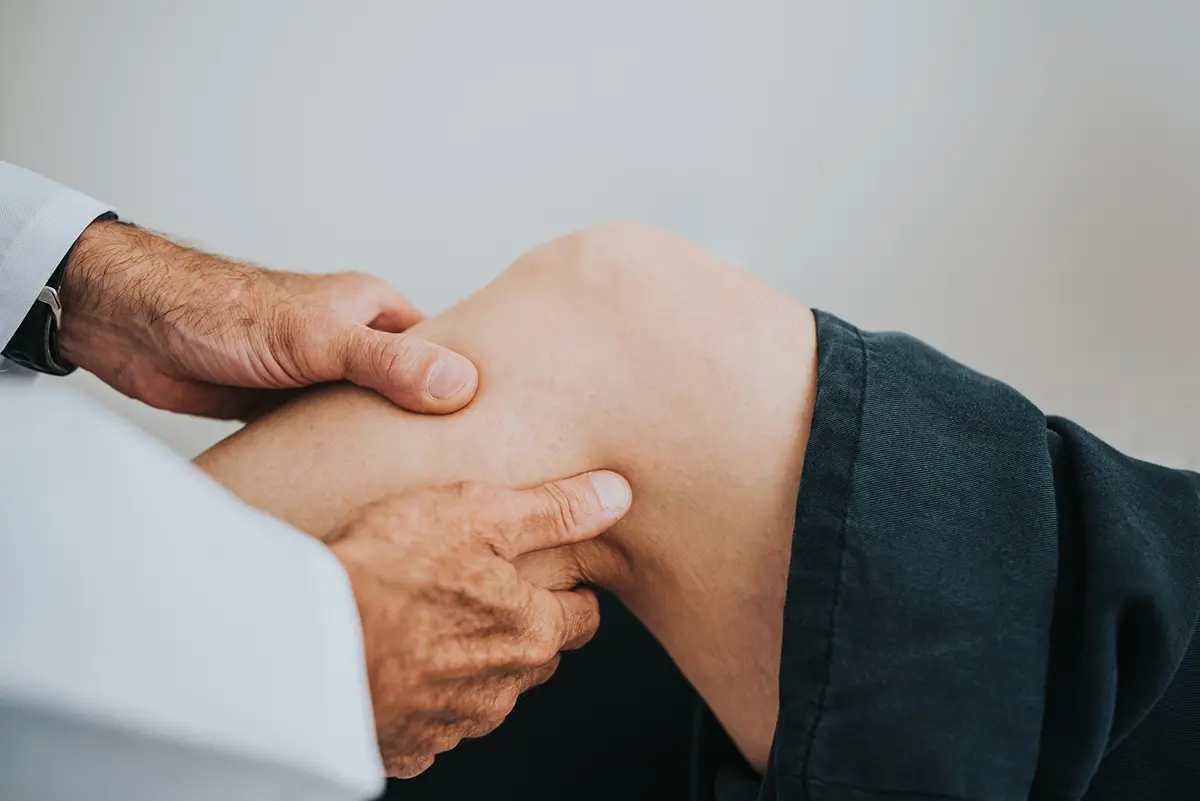When do I see a doctor for my knee pain?
Knee pain is a common problem that can be caused by various factors including injuries, arthritis, and other underlying medical conditions. In some cases, knee pain can be severe and decrease mobility or interfere with daily activities, such as walking and climbing stairs. If your knee pain continues to get worse and is starting to hinder your daily activities, it is time to start looking for medical help. We’ll go over several signs that your knee pain is serious and should be looked at by a doctor so that you can get the help you need.
Why you should see a doctor

While it’s often easier to just continue through the day and deal with pain, that can lead to larger issues down the line that could potentially be prevented. Ignoring persistent knee pain can lead to further complications, such as decreased mobility and flexibility in the joint, as well as an increased risk of falls and injuries. Your doctor should be able to help determine the cause and identify treatment options that can help alleviate your pain. By getting prompt and proper evaluation, you can help ensure that your knee pain is correctly diagnosed and treated appropriately.
Capitol Pain Institute offers multiple therapy options that can help treat the most common sources of knee pain. Whether you’re suffering from pain caused by an injury, arthritis, or previous surgery(s), Capitol Pain Institute’s pain management doctors can help you get the relief you need. Interventional treatment options include cortisone injections, hyaluronic acid (gel) injections, nerve ablations, nerve stimulation, and regenerative techniques such as as PRP (platelet rich plasma).
Symptoms of Serious Knee Pain
It is important to recognize the signs that may indicate a serious underlying issue. Be on the lookout for these symptoms:
Persistent Swelling
Swelling that does not subside after a few days or returns frequently can be a sign of a serious problem.
Inability to Bear Weight
If you are unable to put weight on your knee without experiencing significant pain, it could indicate a severe injury.
Visible Deformity
Any visible changes in the shape or alignment of your knee could suggest a dislocation or fracture.
Severe Pain
Intense pain that doesn’t improve with rest or medication should be evaluated by a healthcare professional.
Limited Range of Motion
Difficulty in bending or straightening your knee can signal structural damage.
Redness and Warmth
These symptoms might indicate an infection or inflammatory condition.
Instability or Buckling
Feeling as if your knee is giving out could be due to ligament damage.
Common Causes of Knee Pain
Understanding the potential causes of knee pain can help in identifying whether you need to see a doctor. The following common causes for knee pain include:
-
Arthritis: Wear and tear (osteoarthritis) or inflammation (rheumatoid arthritis) can cause long-term knee pain and stiffness.
-
Ligament injuries: Stretching or tearing the ACL, MCL, or other ligaments can lead to pain and instability.
-
Meniscus tears: Twisting or turning the knee while it’s bearing weight can tear the cartilage that cushions the joint.
-
Bursitis: The small fluid-filled sacs that cushion your knee can become irritated or inflamed, causing swelling and soreness.
-
Tendonitis: Repeating the same movements or overusing the knee can inflame the tendons, leading to pain when you bend or straighten your leg.
Beyond those specific symptoms, you also want to pay attention to how your knee pain is impacting your life. If you are experiencing any of the following scenarios, you want to schedule a visit to get your knee checked out:
Continual knee pain
Knee pain can often be reduced or eliminated through rest, over-the-counter pain medication, physical therapy, or by heating and icing the area. Often, these are effective methods to manage your pain and are easily handled without the need for a specialist’s help. However, if you have tried these treatment options and the pain has not improved, you may benefit from the care of a pain management physician.
Daily activity difficulties
Sports or fall-related injuries
Disrupted sleep
Common Misconceptions About Knee Pain
Knee pain can be a serious issue as we have discussed, but there are several misconceptions surrounding knee pain and its treatment. Understanding these common misconceptions will better help you make the right decision concerning what steps to take regarding your knee pain.
“Resting Always Solves the Problem”
While rest is important, prolonged inactivity can actually worsen certain conditions. It's crucial to follow a balanced approach including proper exercises.
“Surgery is the Only Option”
Many knee pain conditions can be managed with non-surgical treatments like physical therapy, medications, and lifestyle changes.
“Knee Pain is an Inevitable Part of Aging”
Although common, knee pain is not something you have to simply accept. There are various treatments and preventive measures to maintain knee health.
“Exercise Will Worsen Knee Pain”
While some exercises might exacerbate pain, others, particularly low-impact activities, can strengthen the muscles around the knee and alleviate pain.
Find a knee pain management doctor
If you are dealing with knee pain and need to see a doctor, Capitol Pain Institute is here to help. We have locations in several states and continue to expand. Check out our locations and contact us today
